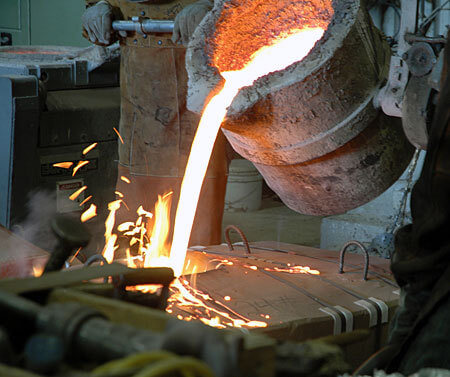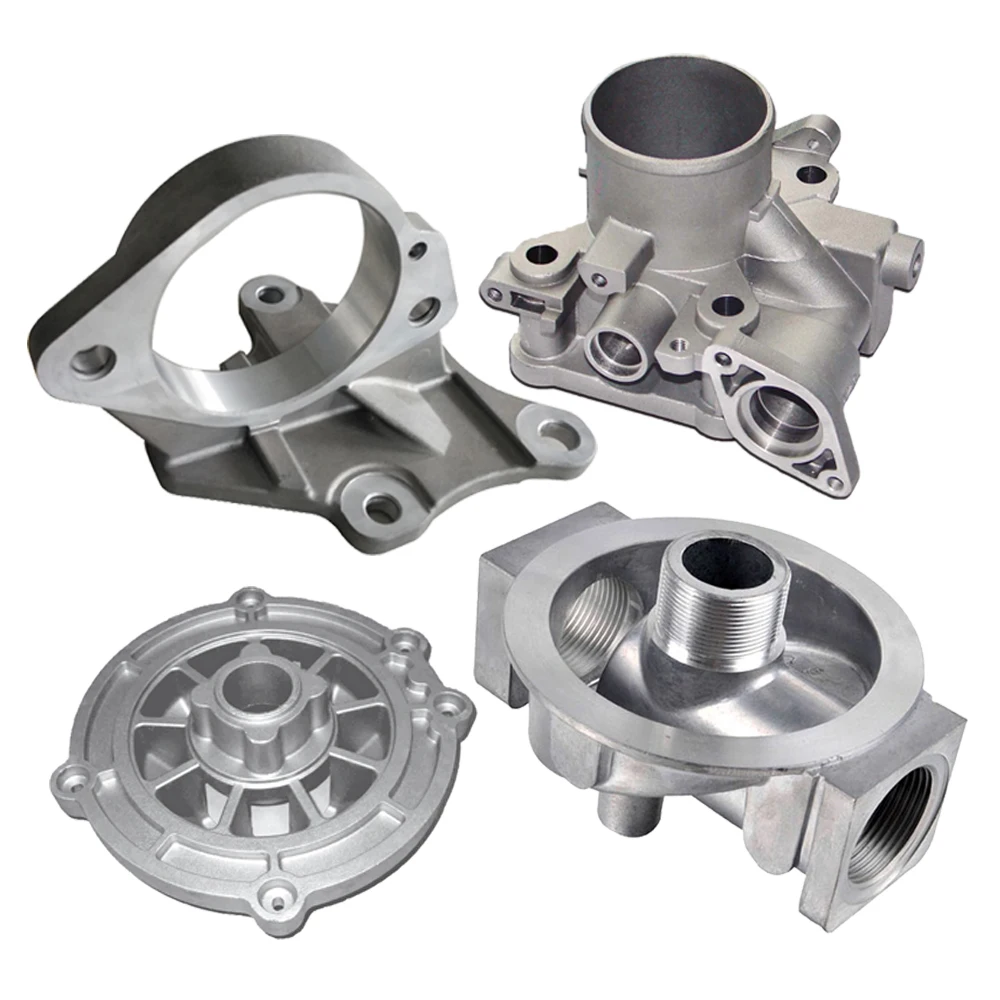Aluminum casting techniques that deliver lightweight components
Wiki Article
Exactly How Aluminum Foundries Contribute to Numerous Industries: A Thorough Review
Light weight aluminum factories function as essential suppliers throughout multiple fields, consisting of auto, aerospace, construction, and electronics. They produce components that are not only lightweight yet additionally sturdy, improving the performance of different items. With advanced spreading strategies and a commitment to sustainability, these foundries are adapting to fulfill progressing industry needs. As they innovate, the influence of aluminum spreadings on various applications increases crucial inquiries concerning the future of manufacturing. What exists in advance for this important market?The Duty of Aluminum Foundries in the Automotive Sector
As the auto market significantly embraces light-weight products to enhance gas effectiveness and efficiency, light weight aluminum factories play a vital role in this advancement. These centers specialize in the production of aluminum castings, which are crucial parts in modern lorries. By supplying high-strength, light-weight components, aluminum shops allow manufacturers to decrease the overall weight of cars, eventually resulting in improved gas economic climate and minimized emissions.Aluminum's resistance to corrosion additionally enhances automobile longevity, making it an appealing selection for automakers. Factories utilize advanced techniques such as die casting and sand spreading to create accurate and intricate parts, ensuring that they meet rigid industry criteria. Furthermore, the capability to reuse light weight aluminum effectively adds to an extra lasting production procedure. As the automotive field proceeds to innovate, light weight aluminum factories will certainly remain essential in supplying the products necessary for the following generation of cars, supporting both efficiency and ecological objectives.

Aerospace Applications of Aluminum Castings
Light weight aluminum spreadings are indispensable to the aerospace sector, offering a mix of light-weight toughness and toughness that is essential for airplane performance. These spreadings are made use of in different parts, such as engine parts, architectural frames, and landing gear, where weight decrease is essential for gas performance and general safety and security. The adaptability of light weight aluminum permits for intricate geometries that boost aerodynamic efficiency while preserving structural integrity.Improvements in casting innovations have actually improved the precision and surface finish of light weight aluminum parts, lowering the demand for comprehensive post-processing. This effectiveness not just speeds up manufacturing timelines yet likewise reduces prices, making aluminum an eye-catching selection for producers. The corrosion resistance of light weight aluminum guarantees longevity and reliability in rough operating settings, better establishing its duty in aerospace applications. As the market progresses, light weight aluminum spreadings continue to be a necessary material, driving advancement and sustaining the development of next-generation aircraft.
Construction Industry Advancements Through Aluminum
The building market has progressively adopted aluminum because of its lightweight buildings and adaptability, paralleling its successful applications in aerospace. Innovations in aluminum layout have actually led to stronger, a lot more efficient structures, making it possible for engineers and builders to discover new possibilities. The material's resistance to rust and low maintenance needs make it especially appealing for both household and industrial jobs.Light weight aluminum's flexibility helps with the production of intricate layouts, permitting visual improvements that were formerly challenging with typical products. Prefabrication strategies have actually likewise developed, making use of aluminum to reduce construction time and costs significantly. Furthermore, the energy efficiency of aluminum systems-- such as window structures and roof-- adds to lasting building methods, straightening with modern-day environmental criteria. As the building and construction industry remains to embrace these advancements, light weight aluminum's duty is expected to broaden, driving more technology and adding to the development of resistant facilities.
Electronics and the Need for Lightweight Aluminum Parts
With the rapid development of innovation, the demand for lightweight aluminum parts in the electronics field has actually risen. As devices become a lot more portable and small, makers look for materials that provide both sturdiness and weight reduction. Light weight aluminum, with its outstanding strength-to-weight ratio, has become a favored choice for elements such as cases, heat sinks, and architectural assistances.Making use of light weight aluminum not just enhances product efficiency yet additionally adds to power performance, as lighter devices call for less power during procedure. In addition, aluminum's excellent conductivity makes it suitable for electronic applications, making certain efficient heat dissipation and reducing the danger of overheating.
As consumer choices change in the direction of light-weight and sleek devices, aluminum factories play an essential function in meeting the advancing needs of the electronics sector (aluminum casting). Their capacity to create high-grade and specific light weight aluminum components supports development, enabling makers to push the borders of layout and capability
Lasting Practices in Light Weight Aluminum Foundries
As the electronic devices sector significantly prioritizes sustainability, aluminum factories are adjusting their methods to straighten with these ecological objectives. Many foundries are carrying out recycling programs that reclaim light weight aluminum scrap, substantially reducing the requirement for resources and reducing waste. By making check here use of energy-efficient innovations, these facilities are reducing their carbon footprint; for instance, employing electric heating systems rather of typical gas-fired ones can result in significant power financial savings.Furthermore, aluminum factories are purchasing water conservation actions, such as closed-loop systems that reuse water made use of in cooling down procedures. These practices not just reduced water consumption however additionally mitigate the environmental effect linked with wastewater discharge. Moreover, numerous shops are discovering renewable resource resources, such as solar and wind power, to satisfy their energy requires sustainably. Via these initiatives, light weight aluminum factories exemplify a dedication to environmental stewardship while remaining to meet the demands of the electronic devices industry.
Future Patterns in Aluminum Factory Technologies
Emerging innovations are positioned to transform light weight aluminum foundries, enhancing efficiency and item quality while advancing sustainability initiatives. Innovations such as expert system and machine understanding are anticipated to optimize manufacturing procedures by predicting equipment failures and enhancing source allotment. The combination of advanced robotics will certainly streamline procedures, lowering labor expenses and minimizing human mistake.Additive manufacturing, or 3D printing, is likewise getting grip, enabling the production of complicated geometries that were formerly unattainable with conventional methods. This shift could result in considerable product savings and lowered waste. Furthermore, clever shops utilizing IoT (Web of Things) technologies will make it possible for real-time tracking and data evaluation, cultivating positive decision-making.
Lastly, the adoption of cleaner melting innovations and recycling strategies will even more lower the environmental impact of aluminum foundries, making them extra sustainable. Collectively, these patterns signal a future where light weight aluminum factories can operate with greater performance and obligation.
Often Asked Inquiries
What Are the Ecological Influences of Light Weight Aluminum Foundries?

Exactly How Do Foundries Make Sure Quality Assurance in Light Weight Aluminum Casting?
Shops ensure top quality control in light weight aluminum casting by executing rigorous evaluation processes, using sophisticated technology, carrying out normal material testing, and adhering to market requirements, consequently preserving uniformity and integrity in their finished items. aluminum casting.What Is the Typical Life-span of Light Weight Aluminum Cast Parts?
The typical life expectancy of aluminum actors parts generally varies from 10 to half a century, relying on elements such as ecological conditions, use, and maintenance. Appropriate care can considerably enhance their toughness and efficiency with time.Exactly How Are Light Weight Aluminum Alloys Selected for Certain Applications?
Aluminum alloys are chosen based upon factors such as stamina, deterioration resistance, weight, and thermal conductivity. Engineers assess the certain requirements of applications to establish one of the most suitable alloy for ideal efficiency and resilience.What Are the Safety And Security Rules for Light Weight Aluminum Foundry Employees?
Safety and security laws for light weight aluminum foundry employees consist of individual safety equipment requireds, air flow requirements, direct exposure restrictions to hazardous products, and protocols for handling molten steel. Compliance guarantees employee security and minimizes health dangers related to factory procedures.As the automotive industry significantly embraces light-weight products to improve fuel performance and performance, light weight aluminum shops play an important role in this advancement. As consumer preferences change in the direction of light-weight and smooth gizmos, aluminum shops play a vital role in satisfying the evolving needs of the electronic devices market. As the electronic devices market increasingly focuses on sustainability, light weight aluminum shops are adapting their practices to straighten with these ecological objectives. Lots of factories are executing reusing programs that recover light weight aluminum scrap, greatly decreasing the demand for raw materials and reducing waste. Safety and security policies for light weight aluminum foundry workers consist of personal protective devices mandates, air flow requirements, direct exposure limitations to unsafe products, and procedures for handling molten metal.
Report this wiki page